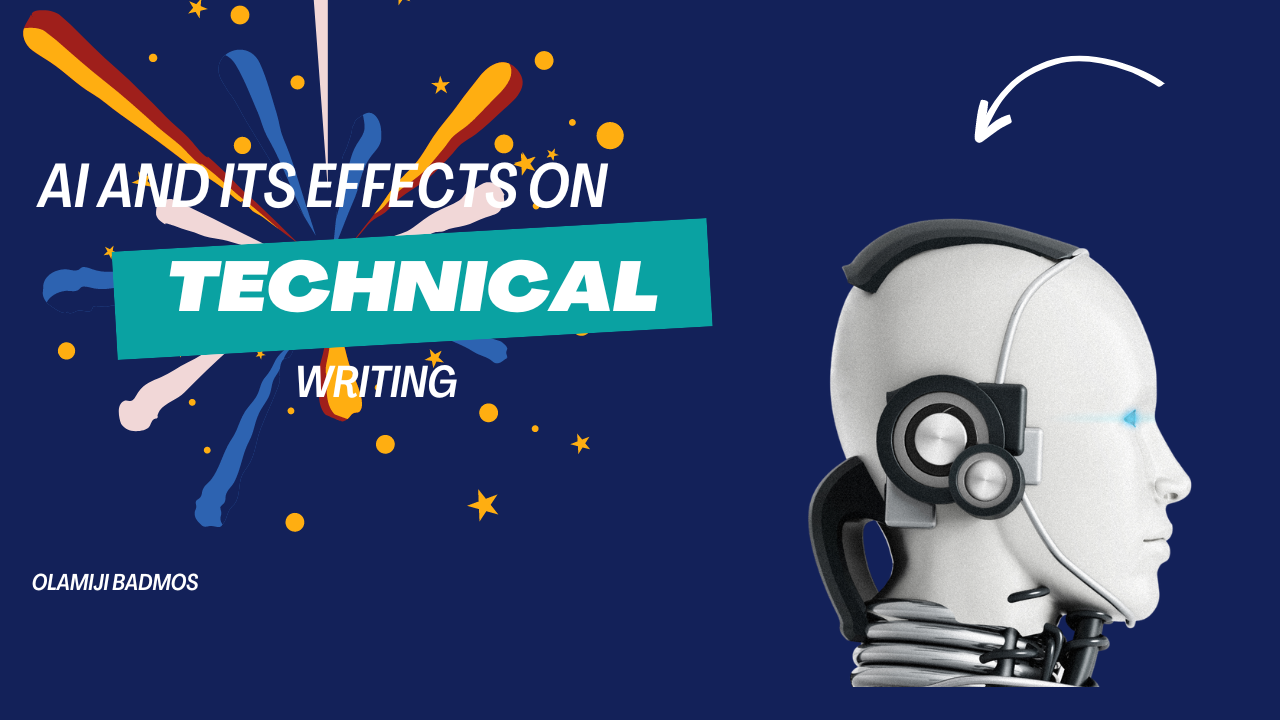AI and Its Effects on Technical Writing
 Olamiji Badmos
Olamiji Badmos
Artificial intelligence (AI) is everywhere in today's fast-paced world, changing industries left and right, including technical writing. How technical writers approach their work changes as AI technologies advance, presenting opportunities and challenges.
Overview of AI Technologies
Before examining how AI affects technical writing, let's first examine the fundamental AI technologies behind these developments.
Natural Language Processing (NLP): is like teaching computers to understand and use human language. It helps machines translate languages, determine if text sounds positive or negative, and summarize long texts into shorter versions.
Machine Learning (ML) Algorithms: are like teaching computers to learn from examples. Instead of giving them specific instructions for every task, we show them many examples, and they learn how to do things independently. They use this learning to make predictions or decisions without us having to tell them what to do every step of the way.
The foundation of AI in technical writing is made up of these technologies. They facilitate work automation, increase productivity, and enhance user interaction with technical documents.
Available AI Tools for Technical Writing
AI is changing the way technical writers work. These tools can help with grammar and style checking, content generation, translation, and even user-specific documentation.
Here are some popular AI tools that can help with these tasks:
Grammarly: is an AI-powered writing assistant. Grammarly is like having a personal writing assistant to help you communicate clearly and effectively.
Key Features
Checks grammar, spelling, and punctuation in real-time.
Suggests improvements to your writing style and tone.
Detects plagiarism.
Works with many platforms (browsers, Microsoft Office, etc.)
ProWritingAid: is a comprehensive writing assistant that checks grammar and provides detailed reports on writing style, readability, and structure.
Key Features
Checks grammar and style.
Provides detailed reports on your writing's clarity, readability, and structure.
Detects plagiarism.
Offers specific suggestions to make your writing better.
Quillbot: is a clever tool that helps you rewrite and improve your writing. Quilbot helps you express your ideas in different and creative ways.
Key Features
Rewrites sentences and paragraphs to make them clearer and more engaging
Suggests better grammar and style
Finds alternative words to use (synonyms)
Works with many writing platforms.
ChatGPT: is an advanced language model developed by OpenAI that can generate human-like text. It can be used to create drafts, answer questions, and generate ideas.
Key Features
Natural and coherent text generation
Context-aware responses
Customizable for specific writing styles
Versatile use cases from drafting to detailed explanations.
Hemingway Editor: is an AI tool designed to make writing bold and clear. It highlights complex sentences and common errors, helping writers improve readability and conciseness.
Key Features:
Readability analysis
Sentence structure improvement
Highlights passive voice and adverbs
Web and desktop versions are available
AI tools have changed technical writing by making it faster, more consistent, and higher quality. These tools save time and offer helpful tips that make writing clearer, more accurate, and more interesting. It is important to note that the available AI tools are not limited to the ones mentioned above. As technology continues to evolve, new AI tools are being developed, offering even more advanced capabilities and features. This ongoing innovation ensures that technical writers will have increasingly powerful resources at their disposal to meet the demands of modern documentation.
Impact on Technical Writing
Writing many documents while maintaining accuracy and consistency before artificial intelligence (AI) was challenging for technical writers. But now, AI tools save time and help get things out faster.
AI's effects on technical writing are as follows:
Generating Technical Content: AI-powered tools can help create technical materials like product manuals, user guides, and technical reports effortlessly by automating the writing process and ensuring consistency in language and style.
Enhanced User Experience: Besides creating technical content, AI makes using technical documents more accessible and more helpful. AI tools improve search functions so users can quickly find what they need. Also, AI-powered chatbots give instant help, guiding users through complicated info and fixing problems.
Predictive Writing: AI tools can help writers by suggesting the right content or information as they work on their documents. This saves time and makes the technical writing better overall.
Efficiency Boost: AI helps writers work faster by doing repetitive tasks for them. This gives them more time to focus on the essential parts of their job, making them more productive and getting content out quicker.
Automated Proofreading: AI systems can automatically detect grammatical, spelling, and punctuation errors in technical publications. They also offer ideas for improving and simplifying language. By doing this, writers may ensure that their documents are clear and error-free without spending a lot of time editing.
Multilingual Support: AI helps translate technical content into different languages, ensuring it stays consistent and fits each culture. This means more people around the world can understand the technical documents.
Knowledge Extraction: AI systems can extract valuable information from large datasets, such as industry regulations or technical specifications, and transform it into understandable technical writing. This makes it easier for writers to gather the correct information and gather it into documents.
Workflow Automation: AI helps speed up the writing process by formatting documents, keeping track of changes, and assisting writers to work together. This lets writers spend more time on the content, making documents even better.
The impact of AI on technical writing goes beyond the mentioned effect. These impacts highlight how AI is transforming not just the creation of documents but also information gathering and collaborative teamwork.
Challenges of AI in Technical Writing
Addressing these challenges is crucial for maximizing the benefits of AI in technical writing while minimizing potential problems.
Some of these challenges include:
Inadequate Data Quality: Content produced by AI may be inaccurate or contain false information, which could mislead users. It is essential to ensure high-quality data in technical writing.
Lack of Personalization: AI-generated content frequently needs more human comprehension and insights, making it difficult for readers to relate to or explain complex concepts.
Ethical Concerns: Using AI in technical writing raises ethical issues with plagiarism, secrecy, and privacy. Maintaining moral principles and ensuring that AI-generated work is properly attributed and transparent is crucial.
Security Issues: Since AI tools might not handle sensitive data safely, integrating AI into technical writing presents security issues. The integrity and confidentiality of technical documentation are in danger because of this.
By carefully examining and verifying information, addressing ethical issues through the creation of unique content, customizing content to each individual's preferences, bringing warmth and empathy to the text, and putting security measures in place to protect sensitive information and prevent data breaches, technical writers play a critical role in overcoming the challenges presented by AI in technical writing.
Conclusion
AI has profoundly transformed technical writing by changing how documents are made, managed, and used. It automates tasks like writing and searching, making things faster and more personalized for users. But along with the benefits come challenges like bias and job worries. It's crucial to think about ethics and work with AI to ensure technical communication stays effective and fair in the future.
However, over-reliance on AI tools can have its drawbacks. Excessive dependence on AI-generated content may lead to a lack of originality and human touch in writing. Additionally, AI tools may not always understand the nuanced context of specialized technical content, potentially resulting in inaccuracies. Therefore, while AI tools are valuable aids, they should complement, not replace, the expertise and critical thinking skills of human writers.
References
Subscribe to my newsletter
Read articles from Olamiji Badmos directly inside your inbox. Subscribe to the newsletter, and don't miss out.
Written by

Olamiji Badmos
Olamiji Badmos
👋 Hi, I'm a Frontend Developer and Technical Writer. 🚀 I craft user-friendly web apps with ReactJs and VueJs. ✍️ Sharing tech knowledge through writing. I'm fueled by a boundless enthusiasm for learning, empowering me to delve into any subject matter to create engaging and compelling content. My passion for exploring new realms and translating complex concepts into accessible, user-friendly content drives my writing.